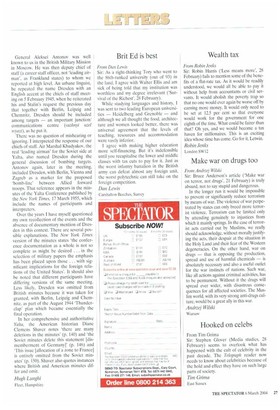From Hugh Lung/ii Sir: Noble Frankland asks whether documentation or
my memory after the lapse of half a century is right — a fair and pertinent question, but wrong. Of course I did not suddenly recollect my work at the Yalta Conference only after 50 years. As a onetime member of the BBC World Service, I have broadcast and elsewhere written and lectured on it for all those years and more, within the limits of official secrets. In August 1994, The Spectator printed my letter about the bombing of Dresden.
General Aleksei Antonov was well known to us in the British Military Mission in Moscow. He was then deputy chief of staff (a career staff officer, not 'leading airman', as Frankland states) to whom we reported at high level. An urbane linguist, he repeated the name Dresden with an English accent at the chiefs of staff meeting on 5 February 1945, when he reiterated his and Stalin's request the previous day that together with Berlin, Leipzig and Chemnitz, Dresden should be included among targets — an important junction/ communications centre (vazhnyi uzel styazi), as he put it.
There was no question of mishearing or ignoring. I interpreted the response of our chiefs of staff. Air Marshal Khudyakov, the real 'leading airman' for the Soviet side at Yalta, also named Dresden during the general discussion of bombing targets. Antonov again, later in the meeting, included Dresden, with Berlin, Vienna and Zagreb as a marker for the proposed 'bomb-line' between Allied forward troops. That reference appears in the minutes of the Yalta Conference published by the New York Times, 17 March 1955, which include the names of participants and interpreters.
Over the years I have myself questioned my own recollection of the events and the absence of documentary mention of Dresden in this context. There are several possible explanations. The New York Times version of the minutes states 'the conference documentation as a whole is not so complete as might be desired . . . in the selection of military papers the emphasis has been placed upon those . . . with significant implications for the foreign relations of the United States'. It should also be noted that different participants have differing versions of the same meeting. Less likely, Dresden was omitted from British minutes because it was taken for granted, with Berlin, Leipzig and Chemnitz, as part of the August 1944 'Thunderclap' plan which became essentially the final operation.
In her comprehensive and authoritative Yalta. the American historian Diane Clemens Shaver notes 'there are many deletions in the minutes' (p. 140) and 'the Soviet minutes delete this statement [dismemberment of Germany1' (p. 146) and 'This issue [allocation of a zone to France] is entirely omitted from the Soviet minutes' (p. 150). Shaver also quotes instances where British and American minutes differ and omit.
Hugh Lunghi
Fleet, Hampshire



















































































 Previous page
Previous page